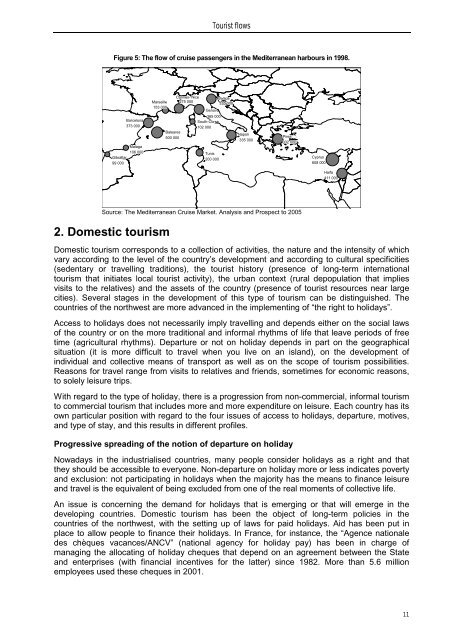dossier sur le tourisme et le développement durable
dossier sur le tourisme et le développement durable
dossier sur le tourisme et le développement durable
Create successful ePaper yourself
Turn your PDF publications into a flip-book with our unique Google optimized e-Paper software.
Tourist flows<br />
Figure 5: The flow of cruise passengers in the Mediterranean harbours in 1998.<br />
Barcelone Barcelona Barcelone<br />
373 373 000<br />
000<br />
Malaga<br />
Malaga<br />
106 106 000<br />
000<br />
Gibraltar Gibraltar<br />
99 99 000<br />
000<br />
Marseil<strong>le</strong> Marseil<strong>le</strong><br />
Marseil<strong>le</strong><br />
153 153 000<br />
000<br />
Baléares Ba<strong>le</strong>ares Baléares Baléares<br />
500 500 000<br />
000<br />
Cannes- Cannes- Nice<br />
Nice<br />
275 275 000<br />
000<br />
Gênes Genova Gênes<br />
365 365 000<br />
000<br />
Corse-Sud South-Corse<br />
Corse-Sud<br />
102 102 000<br />
000<br />
Tunis<br />
Tunis<br />
200 200 000<br />
000<br />
Venise Venice Venise<br />
335 335 000<br />
000<br />
Nap<strong>le</strong>s Napoli Nap<strong>le</strong>s<br />
335 335 000 000<br />
Le Pirea Le Pirée<br />
332 332 000<br />
000<br />
Source: The Mediterranean Cruise Mark<strong>et</strong>. Analysis and Prospect to 2005<br />
2. Domestic tourism<br />
Domestic tourism corresponds to a col<strong>le</strong>ction of activities, the nature and the intensity of which<br />
vary according to the <strong>le</strong>vel of the country’s development and according to cultural specificities<br />
(sedentary or travelling traditions), the tourist history (presence of long-term international<br />
tourism that initiates local tourist activity), the urban context (rural depopulation that implies<br />
visits to the relatives) and the ass<strong>et</strong>s of the country (presence of tourist resources near large<br />
cities). Several stages in the development of this type of tourism can be distinguished. The<br />
countries of the northwest are more advanced in the imp<strong>le</strong>menting of “the right to holidays”.<br />
Access to holidays does not necessarily imply travelling and depends either on the social laws<br />
of the country or on the more traditional and informal rhythms of life that <strong>le</strong>ave periods of free<br />
time (agricultural rhythms). Departure or not on holiday depends in part on the geographical<br />
situation (it is more difficult to travel when you live on an island), on the development of<br />
individual and col<strong>le</strong>ctive means of transport as well as on the scope of tourism possibilities.<br />
Reasons for travel range from visits to relatives and friends, som<strong>et</strong>imes for economic reasons,<br />
to so<strong>le</strong>ly <strong>le</strong>i<strong>sur</strong>e trips.<br />
With regard to the type of holiday, there is a progression from non-commercial, informal tourism<br />
to commercial tourism that includes more and more expenditure on <strong>le</strong>i<strong>sur</strong>e. Each country has its<br />
own particular position with regard to the four issues of access to holidays, departure, motives,<br />
and type of stay, and this results in different profi<strong>le</strong>s.<br />
Progressive spreading of the notion of departure on holiday<br />
Nowadays in the industrialised countries, many peop<strong>le</strong> consider holidays as a right and that<br />
they should be accessib<strong>le</strong> to everyone. Non-departure on holiday more or <strong>le</strong>ss indicates poverty<br />
and exclusion: not participating in holidays when the majority has the means to finance <strong>le</strong>i<strong>sur</strong>e<br />
and travel is the equiva<strong>le</strong>nt of being excluded from one of the real moments of col<strong>le</strong>ctive life.<br />
An issue is concerning the demand for holidays that is emerging or that will emerge in the<br />
developing countries. Domestic tourism has been the object of long-term policies in the<br />
countries of the northwest, with the s<strong>et</strong>ting up of laws for paid holidays. Aid has been put in<br />
place to allow peop<strong>le</strong> to finance their holidays. In France, for instance, the “Agence nationa<strong>le</strong><br />
des chèques vacances/ANCV” (national agency for holiday pay) has been in charge of<br />
managing the allocating of holiday cheques that depend on an agreement b<strong>et</strong>ween the State<br />
and enterprises (with financial incentives for the latter) since 1982. More than 5.6 million<br />
employees used these cheques in 2001.<br />
Chypre Cyprus Chypre Chypre<br />
608 608 000 000<br />
Haïfa Haifa Haïfa<br />
411 411 000<br />
000<br />
11
















